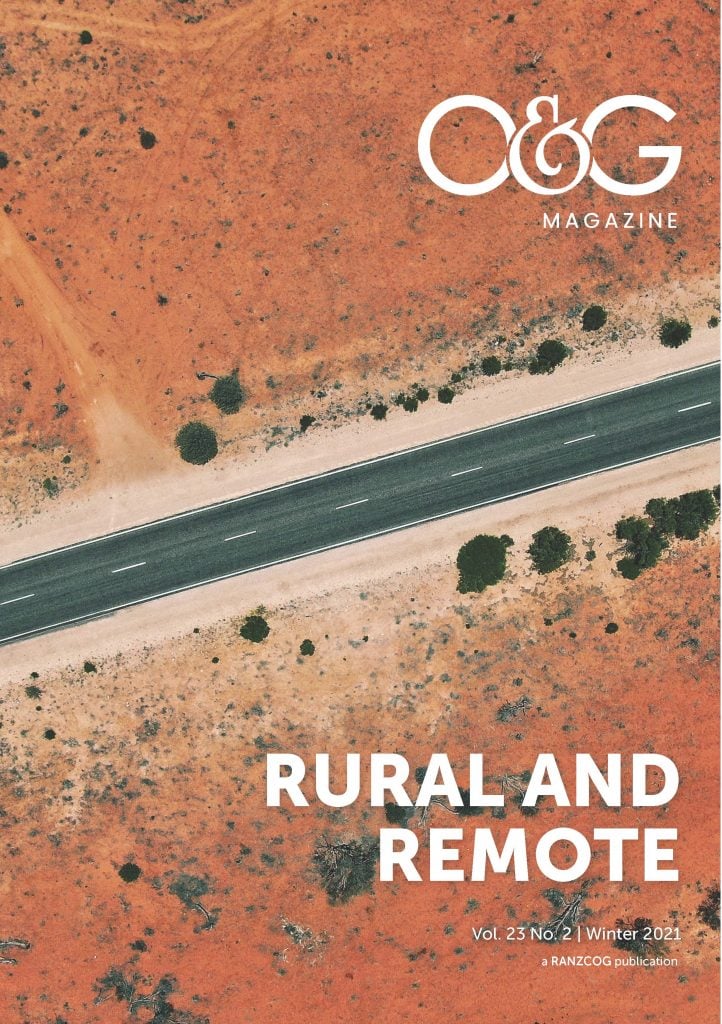I would like to begin by acknowledging the Muralag people, Traditional Custodians of the land and surrounding seas of Waiben, and pay my respects to their Elders past, present and emerging. I thank the Muralag people, big eso, for letting me live on their land and be part of their community. I extend that respect to all Traditional Custodians of the land and surrounds seas of all the Islands throughout the Torres Straight and pay my respects to their Elders past, present and emerging. I also extend that respect to all Aboriginal peoples and Torres Strait Peoples with whom we all live and work with throughout Australia.
The care provided in rural and remote Australia to First Nations women who require birthing services is just as complex and multifaceted as the waterways that the Torres Strait Islands inhabit.
A helicopter lands on the helipad just outside the maternity doors of Thursday Island Hospital (TIH). The blades thud and seem palpable. The midwives and doctors jump in and within minutes the sound fades into the distance as the chopper moves towards the islands that make up this breathtakingly beautiful region of Australia.
The midwives are heading off to the outreach clinics on the outer Islands for booking in appointments, routine antenatal care, pathology collection, birth preparation and postnatal visits. Jammed into their small bag are all that they may need, including the GP Obstetrician’s on-call roster. This will ensure they have the means to contact them for support if required. The list of women needing their maternity care swells and contracts, just like the bellies of the mothers within this unique and remote area. The women are strong and their connection to land, water, and Country is ever present.
The continuity model of care midwifery group practice (MGP) utilised at TIH covers an area of roughly 48,000 square kilometres, from the edge of Papua New Guinea down through the northernmost cape of Queensland. The Torres Strait Islands comprise more than 270 small islands, of which 18 are inhabited. Our midwifery team regularly visits 14. Our service also covers five of the closest communities in the Northern Peninsula Area (NPA).
Torres Strait Islander women here have been required to relocate from their home communities to Thursday Island since the early 1940s when hospital-based maternity services became available in the region. Relocation means leaving their families behind, from 36 weeks, to stay in a hostel to await labour and birth. Their room will have a bed and they will share a fridge and some simple cooking facilities. Young children can accompany their mother (usually under two years of age); however, issues can arise if the expectant mother goes into labour before their support person arrives two to three weeks later (38–39 weeks). The tragedy of this relocation lies in the fact that one’s sense of community is gone. Women may become isolated, especially for those who do not have extended family on the Island. Often the women have only one elected support person by their side during their intrapartum and initial postpartum journey.
Commuting to the hospital for ultrasounds and GP obstetric appointments is not as simple as a 20-minute drive down the road. For some women, their day starts with a 6am ferry ride from the NPA, followed by appointments and a mad dash back to the wharf to return home that evening. For others, it’s an early morning flight, a bus ride to the wharf and a ferry ride to make it to Thursday Island for their appointment. Often this is followed by a night’s stay, as the flight timetable doesn’t allow for day trips if multiple appointments are required. Available accommodation is often full with other women expecting a baby, and also with other individuals dealing with complex medical challenges who require higher-level facility reviews and treatments that are not available in the community and local primary healthcare facilities (PHC). During very busy periods, the hostels’ ability to ensure cultural safety by keeping separate male and female areas, can become impossible and in said instances women may need to stay the night in the hospital.
As noted above, maternity services within the Torres and Cape Islands were established many years ago; however, it was not until June 2017 that the MGP model took hold. The vision was to create a standard where 100% of women accessing maternity care through TIH would have a known midwife. The midwife would be inclusive of the cultural support of our Aboriginal and Torres Strait Islander health workers and our assistants in midwifery. Cohesive relationships between medical and midwifery models have led to the success of the service, where women are held at the centre of their care and each of their respective and unique experiences is held by their own known primary midwife.
Medical officers, midwives and diabetic educators meet weekly to coordinate and collaborate on the care of all women (including those who are high risk) and seek support and guidance from the closest referral centres that are at least 800 km away. Cairns is the closest, but Townsville and Brisbane may also be used depending on the particular need and acuity.
At times, clinical context gets lost, with tertiary facilities unable to conceptualise the fastest possible way to transfer care that is not an RFDS service. It can be days away, not hours. Decisions are made to activate retrievals from outer Islands. This can happen when preterm labour occurs, or any number of other significant obstetric emergencies. In these instances, consults via telehealth occur between TIH and the relevant PHC that are supported by on-the-ground remote area nurses; many of which are not obstetric trained. The outcome of these retrievals is obviously clinically dependent, and in some circumstances, the woman may be required to travel down south to a larger tertiary facility and remain there until birth; yet again removed from their community and support networks, often alone. As the tides shift and change, so does the care planning and delivery of services. Yet one key philosophy remains unwavering: women of the Torres Strait Islands are entitled to receive the best care possible, regardless of the difficult circumstances.






Leave a Reply